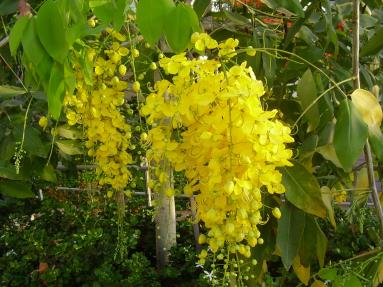
Know Our Herbs

Cassia Fistula
English Name:- Indian laburnum/ Pudding pipe tree.
Botanical Name:- Cassia fitula.
Family:- LEGUMINOSAE
Parts- Used:- Leaves and fruits.
Habit:- A medium sized tree, large compound leaves with 4 to 8 pairs of leaflets, Flowers, Golden yellow on racemes, fruits long cylindrical legumes.
Taste:- Sweet.
Chemical Constituents:- Fruit contains: Glycosides, Crbhohydrates, Resin, Tannins, Magnesium, Calcium, Potassium,. Iron and other compounds are Fistucacdin, Beta- sitosterol, n-tricontanol, Leucopelargonidin, Flavonoids, and Glucosides Gum, Volatile oil.
Actions:- Laxative, Anti-inflammatory, Antipyretic, Expectorant, Antileprotic, Analgesic.
Used In:- Juice of leaves: cure ringworms, Facial paralyses, Rheumatism. (Rubbed in to the affected parts) One of the best laxative (Fleshy part of fruits) Is very useful in constipation.
- Fleshy part of the fruit of this herb is very effective in treating constipation, ulcers and piles.
- The roots of this herb have a great curative effect against common cold. The smoke of its roots is inhaled to cure the mucous that is found along the respiratory tract.
- The pod of the tree is powdered and mixed with honey and consumed. This is very effective in curing cough.
- When infected with fever a tonic is prepared
Usages
- Fleshy part of the fruit of this herb is very effective in treating constipation, ulcers and piles.
- The roots of this herb have a great curative effect against common cold. The smoke of its roots is inhaled to cure the mucous that is found along the respiratory tract.
- The pod of the tree is powdered and mixed with honey and consumed. This is very effective in curing cough.
- When infected with fever a tonic is prepared from the roots of this herb and consumed.
- This herb is very effective in treating skin disorders like irritation and swelling etc.
- It cures fungal infections of the skin like athletes/foot, ringworm etc.
- The bark and fruits of this tree boost the immunity system of the body and help in purification of blood.
- This herb can treat wounds and promotes tissue regeneration.
- The paste of its leaves is used for dressing the infected skin areas.
- This herb reduces blood sugar as much as by30%.
- The decoction prepared from its leaves, fruits and pulp of the tree is used as purgative.
- It cures facial paralyses and rheumatism when rubbed into the effected parts.
Disclaimer
Information on the traditional uses and properties of herbs provided on the site is for educational use only, and is not intended as medical advice. Every attempt has been made for accuracy but none is guaranteed. Many traditional uses and properties of this herb have not been validated by the FDA. If you have any serious health concern you should consult with your health care practitioner before self administering this herb.
